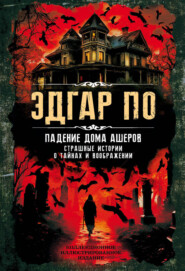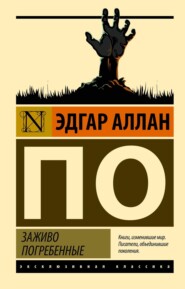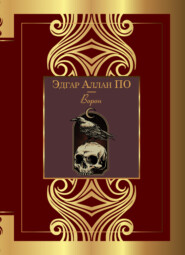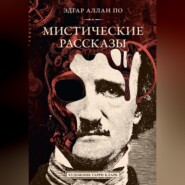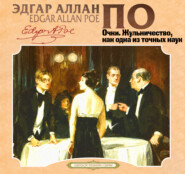По всем вопросам обращайтесь на: info@litportal.ru
(©) 2003-2024.
✖
The Works of Edgar Allan Poe — Volume 4
Настройки чтения
Размер шрифта
Высота строк
Поля
On Frederick’s lip arose a fiendish expression, as he became aware of the direction which his glance had, without his consciousness, assumed. Yet he did not remove it. On the contrary, he could by no means account for the overwhelming anxiety which appeared falling like a pall upon his senses. It was with difficulty that he reconciled his dreamy and incoherent feelings with the certainty of being awake. The longer he gazed the more absorbing became the spell — the more impossible did it appear that he could ever withdraw his glance from the fascination of that tapestry. But the tumult without becoming suddenly more violent, with a compulsory exertion he diverted his attention to the glare of ruddy light thrown full by the flaming stables upon the windows of the apartment.
The action, however, was but momentary, his gaze returned mechanically to the wall. To his extreme horror and astonishment, the head of the gigantic steed had, in the meantime, altered its position. The neck of the animal, before arched, as if in compassion, over the prostrate body of its lord, was now extended, at full length, in the direction of the Baron. The eyes, before invisible, now wore an energetic and human expression, while they gleamed with a fiery and unusual red; and the distended lips of the apparently enraged horse left in full view his gigantic and disgusting teeth.
Stupified with terror, the young nobleman tottered to the door. As he threw it open, a flash of red light, streaming far into the chamber, flung his shadow with a clear outline against the quivering tapestry, and he shuddered to perceive that shadow — as he staggered awhile upon the threshold — assuming the exact position, and precisely filling up the contour, of the relentless and triumphant murderer of the Saracen Berlifitzing.
To lighten the depression of his spirits, the Baron hurried into the open air. At the principal gate of the palace he encountered three equerries. With much difficulty, and at the imminent peril of their lives, they were restraining the convulsive plunges of a gigantic and fiery-colored horse.
“Whose horse? Where did you get him?” demanded the youth, in a querulous and husky tone of voice, as he became instantly aware that the mysterious steed in the tapestried chamber was the very counterpart of the furious animal before his eyes.
“He is your own property, sire,” replied one of the equerries, “at least he is claimed by no other owner. We caught him flying, all smoking and foaming with rage, from the burning stables of the Castle Berlifitzing. Supposing him to have belonged to the old Count’s stud of foreign horses, we led him back as an estray. But the grooms there disclaim any title to the creature; which is strange, since he bears evident marks of having made a narrow escape from the flames.
“The letters W. V. B. are also branded very distinctly on his forehead,” interrupted a second equerry, “I supposed them, of course, to be the initials of Wilhelm Von Berlifitzing — but all at the castle are positive in denying any knowledge of the horse.”
“Extremely singular!” said the young Baron, with a musing air, and apparently unconscious of the meaning of his words. “He is, as you say, a remarkable horse — a prodigious horse! although, as you very justly observe, of a suspicious and untractable character, let him be mine, however,” he added, after a pause, “perhaps a rider like Frederick of Metzengerstein, may tame even the devil from the stables of Berlifitzing.”
“You are mistaken, my lord; the horse, as I think we mentioned, is not from the stables of the Count. If such had been the case, we know our duty better than to bring him into the presence of a noble of your family.”
“True!” observed the Baron, dryly, and at that instant a page of the bedchamber came from the palace with a heightened color, and a precipitate step. He whispered into his master’s ear an account of the sudden disappearance of a small portion of the tapestry, in an apartment which he designated; entering, at the same time, into particulars of a minute and circumstantial character; but from the low tone of voice in which these latter were communicated, nothing escaped to gratify the excited curiosity of the equerries.
The young Frederick, during the conference, seemed agitated by a variety of emotions. He soon, however, recovered his composure, and an expression of determined malignancy settled upon his countenance, as he gave peremptory orders that a certain chamber should be immediately locked up, and the key placed in his own possession.
“Have you heard of the unhappy death of the old hunter Berlifitzing?” said one of his vassals to the Baron, as, after the departure of the page, the huge steed which that nobleman had adopted as his own, plunged and curvetted, with redoubled fury, down the long avenue which extended from the chateau to the stables of Metzengerstein.
“No!” said the Baron, turning abruptly toward the speaker, “dead! say you?”
“It is indeed true, my lord; and, to a noble of your name, will be, I imagine, no unwelcome intelligence.”
A rapid smile shot over the countenance of the listener. “How died he?”
“In his rash exertions to rescue a favorite portion of his hunting stud, he has himself perished miserably in the flames.”
“I-n-d-e-e-d-!” ejaculated the Baron, as if slowly and deliberately impressed with the truth of some exciting idea.
“Indeed;” repeated the vassal.
“Shocking!” said the youth, calmly, and turned quietly into the chateau.
From this date a marked alteration took place in the outward demeanor of the dissolute young Baron Frederick Von Metzengerstein. Indeed, his behavior disappointed every expectation, and proved little in accordance with the views of many a manoeuvering mamma; while his habits and manner, still less than formerly, offered any thing congenial with those of the neighboring aristocracy. He was never to be seen beyond the limits of his own domain, and, in this wide and social world, was utterly companionless — unless, indeed, that unnatural, impetuous, and fiery-colored horse, which he henceforward continually bestrode, had any mysterious right to the title of his friend.
Numerous invitations on the part of the neighborhood for a long time, however, periodically came in. “Will the Baron honor our festivals with his presence?” “Will the Baron join us in a hunting of the boar?” — “Metzengerstein does not hunt;” “Metzengerstein will not attend,” were the haughty and laconic answers.
These repeated insults were not to be endured by an imperious nobility. Such invitations became less cordial — less frequent — in time they ceased altogether. The widow of the unfortunate Count Berlifitzing was even heard to express a hope “that the Baron might be at home when he did not wish to be at home, since he disdained the company of his equals; and ride when he did not wish to ride, since he preferred the society of a horse.” This to be sure was a very silly explosion of hereditary pique; and merely proved how singularly unmeaning our sayings are apt to become, when we desire to be unusually energetic.
The charitable, nevertheless, attributed the alteration in the conduct of the young nobleman to the natural sorrow of a son for the untimely loss of his parents — forgetting, however, his atrocious and reckless behavior during the short period immediately succeeding that bereavement. Some there were, indeed, who suggested a too haughty idea of self-consequence and dignity. Others again (among them may be mentioned the family physician) did not hesitate in speaking of morbid melancholy, and hereditary ill-health; while dark hints, of a more equivocal nature, were current among the multitude.
Indeed, the Baron’s perverse attachment to his lately-acquired charger — an attachment which seemed to attain new strength from every fresh example of the animal’s ferocious and demon-like propensities — at length became, in the eyes of all reasonable men, a hideous and unnatural fervor. In the glare of noon — at the dead hour of night — in sickness or in health — in calm or in tempest — the young Metzengerstein seemed rivetted to the saddle of that colossal horse, whose intractable audacities so well accorded with his own spirit.
There were circumstances, moreover, which coupled with late events, gave an unearthly and portentous character to the mania of the rider, and to the capabilities of the steed. The space passed over in a single leap had been accurately measured, and was found to exceed, by an astounding difference, the wildest expectations of the most imaginative. The Baron, besides, had no particular name for the animal, although all the rest in his collection were distinguished by characteristic appellations. His stable, too, was appointed at a distance from the rest; and with regard to grooming and other necessary offices, none but the owner in person had ventured to officiate, or even to enter the enclosure of that particular stall. It was also to be observed, that although the three grooms, who had caught the steed as he fled from the conflagration at Berlifitzing, had succeeded in arresting his course, by means of a chain-bridle and noose — yet no one of the three could with any certainty affirm that he had, during that dangerous struggle, or at any period thereafter, actually placed his hand upon the body of the beast. Instances of peculiar intelligence in the demeanor of a noble and high-spirited horse are not to be supposed capable of exciting unreasonable attention — especially among men who, daily trained to the labors of the chase, might appear well acquainted with the sagacity of a horse — but there were certain circumstances which intruded themselves per force upon the most skeptical and phlegmatic; and it is said there were times when the animal caused the gaping crowd who stood around to recoil in horror from the deep and impressive meaning of his terrible stamp — times when the young Metzengerstein turned pale and shrunk away from the rapid and searching expression of his earnest and human-looking eye.
Among all the retinue of the Baron, however, none were found to doubt the ardor of that extraordinary affection which existed on the part of the young nobleman for the fiery qualities of his horse; at least, none but an insignificant and misshapen little page, whose deformities were in everybody’s way, and whose opinions were of the least possible importance. He — if his ideas are worth mentioning at all — had the effrontery to assert that his master never vaulted into the saddle without an unaccountable and almost imperceptible shudder, and that, upon his return from every long-continued and habitual ride, an expression of triumphant malignity distorted every muscle in his countenance.
One tempestuous night, Metzengerstein, awaking from a heavy slumber, descended like a maniac from his chamber, and, mounting in hot haste, bounded away into the mazes of the forest. An occurrence so common attracted no particular attention, but his return was looked for with intense anxiety on the part of his domestics, when, after some hours’ absence, the stupendous and magnificent battlements of the Chateau Metzengerstein, were discovered crackling and rocking to their very foundation, under the influence of a dense and livid mass of ungovernable fire.
As the flames, when first seen, had already made so terrible a progress that all efforts to save any portion of the building were evidently futile, the astonished neighborhood stood idly around in silent and pathetic wonder. But a new and fearful object soon rivetted the attention of the multitude, and proved how much more intense is the excitement wrought in the feelings of a crowd by the contemplation of human agony, than that brought about by the most appalling spectacles of inanimate matter.
Up the long avenue of aged oaks which led from the forest to the main entrance of the Château Metzengerstein, a steed, bearing an unbonneted and disordered rider, was seen leaping with an impetuosity which outstripped the very Demon of the Tempest.
The career of the horseman was indisputably, on his own part, uncontrollable. The agony of his countenance, the convulsive struggle of his frame, gave evidence of superhuman exertion: but no sound, save a solitary shriek, escaped from his lacerated lips, which were bitten through and through in the intensity of terror. One instant, and the clattering of hoofs resounded sharply and shrilly above the roaring of the flames and the shrieking of the winds — another, and, clearing at a single plunge the gate-way and the moat, the steed bounded far up the tottering staircases of the palace, and, with its rider, disappeared amid the whirlwind of chaotic fire.
The fury of the tempest immediately died away, and a dead calm sullenly succeeded. A white flame still enveloped the building like a shroud, and, streaming far away into the quiet atmosphere, shot forth a glare of preternatural light; while a cloud of smoke settled heavily over the battlements in the distinct colossal figure of —a horse.
THE SYSTEM OF DOCTOR TARR AND PROFESSOR FETHER
DURING the autumn of 18 — , while on a tour through the extreme southern provinces of France, my route led me within a few miles of a certain Maison de Sante or private mad-house, about which I had heard much in Paris from my medical friends. As I had never visited a place of the kind, I thought the opportunity too good to be lost; and so proposed to my travelling companion (a gentleman with whom I had made casual acquaintance a few days before) that we should turn aside, for an hour or so, and look through the establishment. To this he objected — pleading haste in the first place, and, in the second, a very usual horror at the sight of a lunatic. He begged me, however, not to let any mere courtesy towards himself interfere with the gratification of my curiosity, and said that he would ride on leisurely, so that I might overtake him during the day, or, at all events, during the next. As he bade me good-bye, I bethought me that there might be some difficulty in obtaining access to the premises, and mentioned my fears on this point. He replied that, in fact, unless I had personal knowledge of the superintendent, Monsieur Maillard, or some credential in the way of a letter, a difficulty might be found to exist, as the regulations of these private mad-houses were more rigid than the public hospital laws. For himself, he added, he had, some years since, made the acquaintance of Maillard, and would so far assist me as to ride up to the door and introduce me; although his feelings on the subject of lunacy would not permit of his entering the house.
I thanked him, and, turning from the main road, we entered a grass-grown by-path, which, in half an hour, nearly lost itself in a dense forest, clothing the base of a mountain. Through this dank and gloomy wood we rode some two miles, when the Maison de Sante came in view. It was a fantastic chateau, much dilapidated, and indeed scarcely tenantable through age and neglect. Its aspect inspired me with absolute dread, and, checking my horse, I half resolved to turn back. I soon, however, grew ashamed of my weakness, and proceeded.
As we rode up to the gate-way, I perceived it slightly open, and the visage of a man peering through. In an instant afterward, this man came forth, accosted my companion by name, shook him cordially by the hand, and begged him to alight. It was Monsieur Maillard himself. He was a portly, fine-looking gentleman of the old school, with a polished manner, and a certain air of gravity, dignity, and authority which was very impressive.
My friend, having presented me, mentioned my desire to inspect the establishment, and received Monsieur Maillard’s assurance that he would show me all attention, now took leave, and I saw him no more.
When he had gone, the superintendent ushered me into a small and exceedingly neat parlor, containing, among other indications of refined taste, many books, drawings, pots of flowers, and musical instruments. A cheerful fire blazed upon the hearth. At a piano, singing an aria from Bellini, sat a young and very beautiful woman, who, at my entrance, paused in her song, and received me with graceful courtesy. Her voice was low, and her whole manner subdued. I thought, too, that I perceived the traces of sorrow in her countenance, which was excessively, although to my taste, not unpleasingly, pale. She was attired in deep mourning, and excited in my bosom a feeling of mingled respect, interest, and admiration.
I had heard, at Paris, that the institution of Monsieur Maillard was managed upon what is vulgarly termed the “system of soothing” — that all punishments were avoided — that even confinement was seldom resorted to — that the patients, while secretly watched, were left much apparent liberty, and that most of them were permitted to roam about the house and grounds in the ordinary apparel of persons in right mind.
Keeping these impressions in view, I was cautious in what I said before the young lady; for I could not be sure that she was sane; and, in fact, there was a certain restless brilliancy about her eyes which half led me to imagine she was not. I confined my remarks, therefore, to general topics, and to such as I thought would not be displeasing or exciting even to a lunatic. She replied in a perfectly rational manner to all that I said; and even her original observations were marked with the soundest good sense, but a long acquaintance with the metaphysics of mania, had taught me to put no faith in such evidence of sanity, and I continued to practise, throughout the interview, the caution with which I commenced it.
Presently a smart footman in livery brought in a tray with fruit, wine, and other refreshments, of which I partook, the lady soon afterward leaving the room. As she departed I turned my eyes in an inquiring manner toward my host.
“No,” he said, “oh, no — a member of my family — my niece, and a most accomplished woman.”
“I beg a thousand pardons for the suspicion,” I replied, “but of course you will know how to excuse me. The excellent administration of your affairs here is well understood in Paris, and I thought it just possible, you know —
“Yes, yes — say no more — or rather it is myself who should thank you for the commendable prudence you have displayed. We seldom find so much of forethought in young men; and, more than once, some unhappy contre-temps has occurred in consequence of thoughtlessness on the part of our visitors. While my former system was in operation, and my patients were permitted the privilege of roaming to and fro at will, they were often aroused to a dangerous frenzy by injudicious persons who called to inspect the house. Hence I was obliged to enforce a rigid system of exclusion; and none obtained access to the premises upon whose discretion I could not rely.”
“While your former system was in operation!” I said, repeating his words — “do I understand you, then, to say that the ‘soothing system’ of which I have heard so much is no longer in force?”
“It is now,” he replied, “several weeks since we have concluded to renounce it forever.”
“Indeed! you astonish me!”
“We found it, sir,” he said, with a sigh, “absolutely necessary to return to the old usages. The danger of the soothing system was, at all times, appalling; and its advantages have been much overrated. I believe, sir, that in this house it has been given a fair trial, if ever in any. We did every thing that rational humanity could suggest. I am sorry that you could not have paid us a visit at an earlier period, that you might have judged for yourself. But I presume you are conversant with the soothing practice — with its details.”
“Not altogether. What I have heard has been at third or fourth hand.”
“I may state the system, then, in general terms, as one in which the patients were menages-humored. We contradicted no fancies which entered the brains of the mad. On the contrary, we not only indulged but encouraged them; and many of our most permanent cures have been thus effected. There is no argument which so touches the feeble reason of the madman as the argumentum ad absurdum. We have had men, for example, who fancied themselves chickens. The cure was, to insist upon the thing as a fact — to accuse the patient of stupidity in not sufficiently perceiving it to be a fact — and thus to refuse him any other diet for a week than that which properly appertains to a chicken. In this manner a little corn and gravel were made to perform wonders.”
“But was this species of acquiescence all?”






